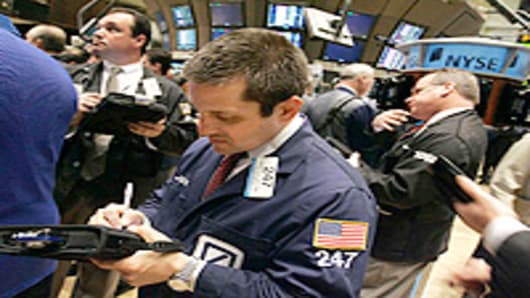Goldman Sachs became the latest Wall Street firm to predict that the U.S. economy will drop into recession this year, saying the Federal Reserve will have to cut interest rates to 2.5 percent by the third quarter as a result.
"Over the past few months, we have become increasingly concerned that the US housing and credit market downturn would trigger not just a growth slowdown and substantial Fed easing -- our long-standing view -- but also an outright recession," Goldman Sachs said in a note to clients Wednesday. "The latest data suggest that recession has now arrived, or will very shortly."
The recent rise in unemployment is particularly worrisome, Goldman indicated.
Merrill Lynch North American Economist David Rosenberg said the U.S. had entered its first-blown recession in 16 years. Rosenberg has been calling for a consumer recession since the third quarter of last year, but after Friday's payroll numbers, which showed unemployment had ticked up to 5.0%, he called for an outright recession.
"Friday's employment report confirmed our suspicions that the economy was transitioning into an official recession toward the end of last year," Rosenberg said in a research note on Monday.
Goldman's prediction calls for the recession to "last 2-3 quarters" and it "should be relatively mild by historical standards, with a cumulative decline in real GDP of only about 0.5 percent (not annualized)."
Three factors will soften the projected recession's impact, Goldman said. First, the Fed will lower rates, probably beginning with a 50-basis point cut at its end-of-January meeting, the investment bank predicted. In addition, the federal government will likely take some stimulus action. And in the background, a weakening dollar will give exports a boost, helping the overall business picture.
Nevertheless, Goldman said real gross domestic product would only rise 0.8 percent for 2008. The investment bank added that the economy would contract by 1 percent on an annualized basis in both the second and third quarters. As a result, the unemployment rate would jump to 6.5 percent in 2009 from the current 5 percent, it said.
Consumer spending and corporate profits will be hurt, the bank said.
"With our switch to an outright recession call, we have also deepened our forecast for the cumulative decline in nominal house prices, to a 20-25 percent peak-to-trough decline from a 15 percent drop previously," Goldman said.
The federal funds rate currently stands at 4.25 percent. Goldman, in the note authored by economist Jan Hatzius, said the Fed would be forced to bring that rate down to 2.5 percent.
The Fed has already cut rates three times in the latter half of last year.


